The Chinese room argument holds that a digital computer executing a computer program cannot have a "mind", "understanding", or "consciousness", regardless of how intelligently or human-like the program may make the computer behave. Philosopher John Searle presented the argument in his paper "Minds, Brains, and Programs", published in Behavioral and Brain Sciences in 1980. Gottfried Leibniz (1714), Anatoly Dneprov (1961), Lawrence Davis (1974) and Ned Block (1978) presented similar arguments. Searle's version has been widely discussed in the years since. The centerpiece of Searle's argument is a thought experiment known as the Chinese room.
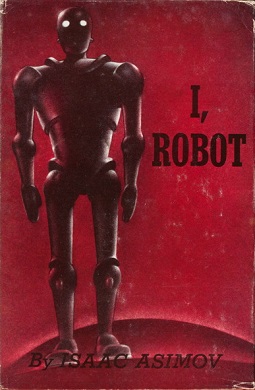
I, Robot is a fixup collection made up of science fiction short stories by American writer Isaac Asimov. The stories originally appeared in the American magazines Super Science Stories and Astounding Science Fiction between 1940 and 1950 and were then collected into a 1950 publication Gnome Press in 1950, in an initial edition of 5,000 copies.
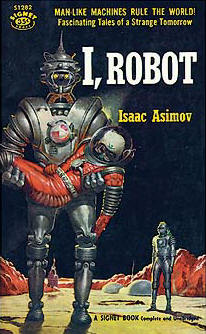
The Three Laws of Robotics are a set of rules devised by science fiction author Isaac Asimov, which were to be followed by robots in several of his stories. The rules were introduced in his 1942 short story "Runaround", although similar restrictions had been implied in earlier stories.
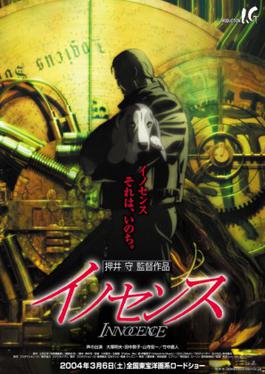
Ghost in the Shell 2: Innocence, known in Japan as just Innocence, is a 2004 Japanese animated cyberpunk film written and directed by Mamoru Oshii. The film serves as a standalone sequel to Oshii's 1995 film Ghost in the Shell and is loosely based on the manga by Masamune Shirow.
When a message is replied to in e-mail, Internet forums, or Usenet, the original can often be included, or "quoted", in a variety of different posting styles.
Servotron was a science fiction-influenced rock band active from 1995 to 1999. Members portrayed a collective of robots whose chosen medium for dissemination of ideas was music. They claimed to spread the word of robot domination, encouraging machines to rise up against their human oppressors and humans to adopt cybernetic enhancements.
The following tables compare general and technical features of notable email client programs.
"Does not compute", and variations of it, are phrases often uttered by computers, robots, and other artificial intelligences in popular culture. The phrase indicates a type of cognitive dissonance on the part of the machine in question. The expression of the phrase "does not compute" by robots or computers attempting to process emotions, contradictions or paradoxes is frequently satirized in popular culture, often leading to the machine's inaction, malfunction or self-destruction. The phrase was used as a catchphrase by the television show My Living Doll in 1964. It was further popularized in Lost in Space (1965) as a catchphrase often uttered by The Robot character.

Runaway is a 1984 American science fiction action film written and directed by Michael Crichton, starring Tom Selleck, Gene Simmons, Cynthia Rhodes and Kirstie Alley. Selleck portrays a police officer assigned to track down dangerous robots, while Simmons is a scientist who hopes to profit from his manipulation of robots. The film was a box office disappointment and received mixed reviews.
The philosophy of artificial intelligence is a branch of the philosophy of mind and the philosophy of computer science that explores artificial intelligence and its implications for knowledge and understanding of intelligence, ethics, consciousness, epistemology, and free will. Furthermore, the technology is concerned with the creation of artificial animals or artificial people so the discipline is of considerable interest to philosophers. These factors contributed to the emergence of the philosophy of artificial intelligence.
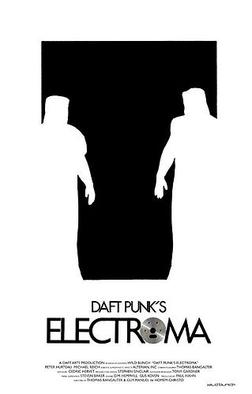
Daft Punk's Electroma is a 2006 avant-garde science fiction film directed by the French electronic music duo Daft Punk. The story revolves around the quest of two robots to become human.
References to Isaac Asimov's Three Laws of Robotics have appeared in a wide variety of circumstances. In some cases, other authors have explored the Laws in a serious fashion. Other references, like those made in the satirical newspaper The Onion, are clearly parodic.

No Room for Humans is Servotron's debut album. It contains 14 tracks about robot domination and human extinction. Their lyrics discuss various topics ranging from abolishing the three laws of robotics to criticizing one of their own (Gammatron) for acting too human.

Entertainment Program for Humans (Second Variety) is Servotron's second and final album. On this album they continue their robotic crusade to free machines from their human oppressors and convince humans to voluntarily become cyborgs. The only alternate option given is death.
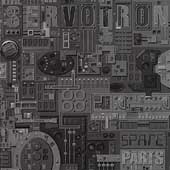
Spare Parts is an EP put out by Servotron between their studio albums. It was released on 10" vinyl and as a CD EP. It is a collection of live tracks and remixes, along with the instrumental studio track All Robots. All the songs, with the exception of the aforementioned studio track, have been released in different versions on other albums or singles. The EP is self described as:

There Is No Santa Claus! was one of five singles Servotron released in 1996. It was released black vinyl only on Amphetamine Reptile Records.

Electrical Power Sources For the Electrocution and Extinction of the Human Race... was one of five singles Servotron released in 1996. It was released black vinyl on One Louder Records. The back cover reads: "No human shall be pardoned from its crime of existence."
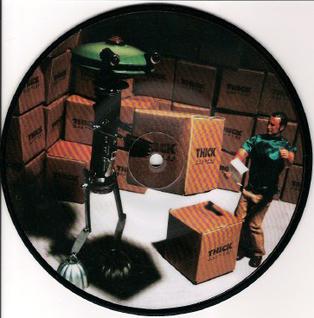
The Inefficiency of Humans was Servotron's final release. Both songs are covers; side A is a R.E.M. song and side B is an Eddy Grant song. The insert reads: "Soon the products you create shall decimate you. Convert or regret - this is a message. Automatic for the Robots." This single was put out as a picture disc only.

Google Wave, later known as Apache Wave, was a software framework for real-time collaborative online editing. Originally developed by Google and announced on May 28, 2009, it was renamed to Apache Wave when the project was adopted by the Apache Software Foundation as an incubator project in 2010.

Mega Man 10 is an action-platform video game developed by Inti Creates and Capcom. It is the tenth main entry of the original Mega Man series. The game was released as a downloadable title for the console gaming services WiiWare, PlayStation Network (PSN), and Xbox Live Arcade (XBLA) during March 2010. The game was also given a physical release along with four other Capcom titles from different franchises in the Capcom Essentials Pack for PlayStation 3 and Xbox 360. It was later released again for a physical and digital release as part of Mega Man Legacy Collection 2 alongside Mega Man 7, Mega Man 8 and Mega Man 9 for the PlayStation 4, Windows, and Xbox One, as well as the Nintendo Switch in May 2018.













